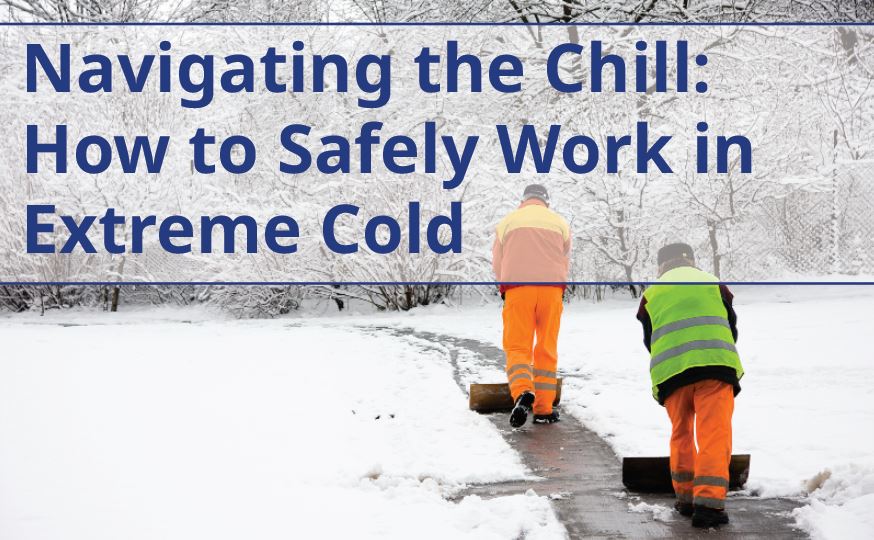
As winter sets in and temperatures plummet into negative numbers, individuals working in outdoor professions face the challenges of extreme cold conditions. Safety becomes paramount to ensure well-being and productivity.
Here are a few tips to keep you safe and still be able to complete your job duties.
- Dressing Appropriately: Layering is crucial in extreme cold. Start with moisture-wicking base layers to keep sweat away from the skin. Add insulating layers for warmth and a waterproof outer layer to shield against wind and snow. Don’t forget to protect your extremities with insulated gloves, hats, and insulated, waterproof boots.
- Stay Dry: Wet clothing significantly increases the risk of hypothermia. Ensure that outer layers are waterproof, and invest in quality rain gear. Carry spare clothing to change into if you get wet, and take breaks to let wet items dry.
- Take Regular Breaks: Prolonged exposure to extreme cold can lead to fatigue and increased vulnerability to cold-related illnesses. Schedule regular breaks in a warm, sheltered area to allow the body to recover and warm up.
- Hydration and Nutrition: Staying hydrated is essential, even in cold weather. Drink warm beverages and avoid excessive caffeine or alcohol intake, as they can contribute to dehydration. Consume high-energy foods to maintain body heat.
- Recognize the Signs of Cold-Related Illnesses: Familiarize yourself with the symptoms of cold-related illnesses such as hypothermia and frostbite. Early detection is crucial. Seek medical attention if you notice numbness, tingling, or discoloration in extremities.
- Use Heated Spaces Wisely: When taking breaks indoors, make sure the transition from cold to warm environments is gradual to prevent thermal shock. Avoid prolonged exposure to direct heat sources, as this can increase the risk of burns.
- Be Aware of Wind Chill: Wind can significantly amplify the effects of cold temperatures. Monitor wind chill forecasts and take appropriate precautions. Windproof clothing and face protection become crucial in windy conditions.
- Communication and Emergency Preparedness: Ensure that communication devices are functional in cold weather. Establish an emergency plan, and communicate it to all team members. Familiarize yourself with emergency procedures and the location of nearby shelters.
Working in extreme cold temperatures requires careful planning and adherence to safety protocols. By dressing appropriately, staying dry, taking regular breaks, and being aware of the signs of cold-related illnesses, individuals can navigate the challenges of winter work safely. Prioritize your well-being and create a work environment that safeguards against the harsh conditions of extreme cold.

Model Utility Task Vehicle Operator Policy Now Available
The use of UTVs and ATVs by local governments has increased dramatically over the last few years. The versatility of those vehicles lends themselves to doing a variety of tasks including work in parks and conservation, search and rescue, firefighting and other jobs in areas unsuitable for regular vehicles. As the popularity of UTVs has grown, the number of claims involving employees improperly using UTVs has also grown. In a review of those claims, the lack of training on how to safely and properly operate the vehicles is the primary issue.
To help reduce these avoidable claims, IMWCA has developed an Off-Road Vehicle Operators Safety Manual. The policy was formed from materials from the U.S. Forest Service, Iowa DNR, manufacturers’ recommendations and other source materials
Renewal Policy Information
The new experience modification factors for the 2024-25 renewals will be available soon for members and agents through our online portal at www.IMWCA.org. Watch for an email when it posted. If you need assistance with your login contact Andrew Justice.
Do you have questions as to how the experience modification factor works? Maybe you need a quick refresher? Check out a webinar on understanding your mod.
The payroll renewal worksheets will also be available for members to fill out and update via the portal on February 12.

Reminder: OSHA Reporting
OSHA recordkeeping requires any employers with 11 or more employees to track reportable injuries annually. LEARN MORE.

Let us know if other short videos would help set up your LEARN platform.
LEARN Administrator Refresher
IMWCA provides its members access to 300+ courses on NEOGOV’s LEARN platform for safety, HR, and other relevant topics. Members can create training, upload policies, and store documentation.
IMWCA has created short videos to help with setting up classes and LEARN users. These videos cover topics such as “How to Add a Learner,” “How to Create a Department & Position,” “How to Remove a Learner,” “How to Enroll a Learner in a Class,” and “How to Add Credit for Group Training.”

2024 Key Dates Calendar
Stay on top of upcoming deadlines and events in 2024, by subscribing to IMWCA’s Key Dates Calendar. The calendar includes OSHA reporting deadlines, renewal and audit timelines, and relevant training.





